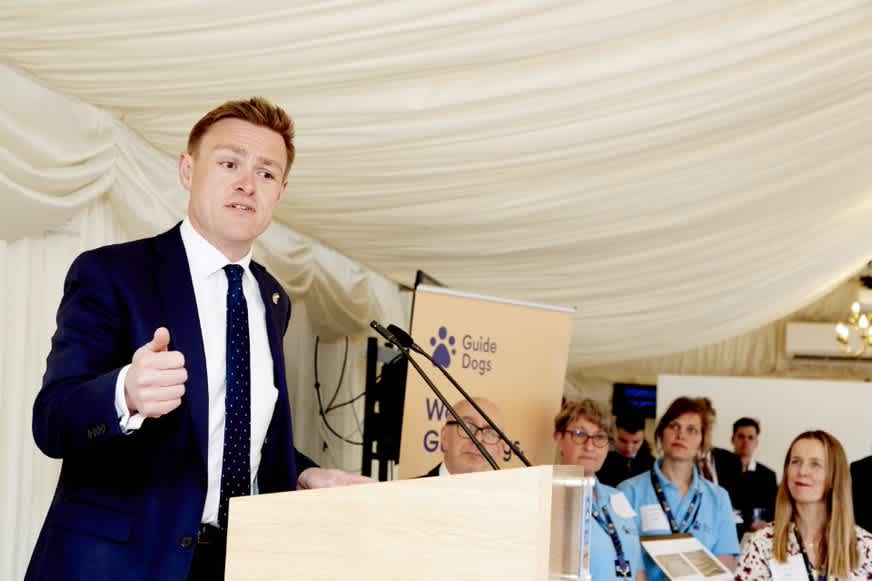New research, released today, reveals that two in three primary and secondary school teachers lack confidence in teaching children with a vision impairment.
In a poll of just under 5,000 teachers, conducted by Teacher Tapp on behalf of Guide Dogs, 85 per cent of teachers said working with specialist professionals would increase their confidence in helping students with visual impairments. A key component which is missing in the Governments plans to improve education for disabled children.
These findings come following the publication of the Government’s SEND Review, which contains policy proposals that could have a positive impact on the lives of children and young people with a vision impairment.
Guide Dogs is calling on the Government to prioritise the role of specialist professionals, such as habilitation workers or Qualified Teachers of the Visually Impaired (QVTI), in the education of blind and partially sighted children.
The research also revealed that 56 per cent of teachers were in favour of further training to include information on working with children with a vision impairment. With just under half (48 per cent) also wanting clarified guidance on what ‘reasonable adjustments’ (under the Equality Act 2010) could be put in place in the classroom.
There are 34,000 children and young people in England growing up with a vision impairment, 24,000 of whom are under-18. Around 20 per cent of children and young people with a vision impairment have additional special educational needs and/or disabilities (SEND) and 30 per cent have complex needs.
Accessing services and support at the right time can be a gateway to increasing the confidence, happiness and independence of children and young people with a vision impairment, and can have a positive impact for parents, carers and families.
Guide Dogs is the UK’s largest charitable provider of services for children and young people with a vision impairment and helps provide specialist professional support from habilitation specialists working with teachers and special education staff or advising on assistive technologies.
A lack of support from specialist professionals and children with vision impairments failing to get the reasonable adjustments they require means many young people are missing out.
Lauren Mortimer, now 22 remembers her experiences of school. Lauren said: “I was the only visually impaired student in a school of around 2,500 students and they didn’t know how to deal with me, as they had never had a visually impaired student before. I would be given one-to-one support, but the one-to-one teachers didn’t understand what to do. One of my teachers would take notes for me but I couldn’t read them back.
“As part of my GCSE drama course we were taken to see two performances, but I wasn’t taken to an audio described version and was told if I wanted to go to one I would have to go by myself after school and fund my own ticket. They also didn’t inform the examiner I was visually impaired, so the bright lights meant my remaining vision was gone and I was squinting. The examiner didn’t take my visual impairment into account, and I ended up failing my GCSE drama.”

Too often, the education system lets these young people down as they struggle to access the support they need. Just one in four working age adults with a vision impairment are employed.
“What we are hearing from teachers is worrying and we urgently need the Government to address this. Children and young people with a vision impairment tell us they want to grow up enjoying the same opportunities as their classmates: pursuing education and learning, exploring life outside the classroom and realising their ambitions for adulthood.”
Blanche Shackleton, Head of Policy, Public Affairs and Campaigns at Guide Dogs

Guide Dogs is calling on the Education Secretary during the SEND Review consultation process to ensure that children and young people with vision impairment are not forgotten. Guide Dogs’ key recommendations, outlined at a parliamentary event, include:
1) Greater recognition throughout the education system of low incidence, high need conditions such as vision impairment.
2) Greater prioritisation to the critical role specialist professionals like habilitation workers or QVTIs can play in a young person’s education.
3) Changes to Education, Health and Care Plans to include provision of more anticipatory support to stop a young person from falling behind, before they can access support.
Guide Dogs is asking people to sign our open letter to Nadhim Zahawi, Secretary of State for Education, Sajid Javid, Secretary of State for Health and Michael Gove, the Secretary of State for Levelling Up, Housing and Communities to make #AllThingsEqual.

